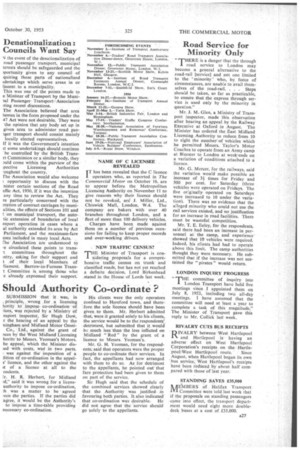Should Authority Co-ordinate ?
Page 29

If you've noticed an error in this article please click here to report it so we can fix it.
SUBMISSION that it. was, in ; principle, wrong for a licensing horny to impose co-ordination • of ices, was rejected by a Ministry of nstiort inspector, Sir Hugh Dow, ✓ the hearing of an appeal by the ningham and Midland Motor OmniCo., Ltd:, againstthe grant of aces by the West Midland Licensing hority to Messrs. Yeoman's Motors. he appeal, which the Minister disied with costs, Wag` in two parts. was against the imposition of a Jition of co-ordination in the appels' licence, and the other against the it of a licence at all to the ondents.
fr. H. R. Herbert, for Midland KI," said it was wrong for a licensauthority to impose co-ordination, :la was a matter to be agreed ,een -the parties. If the parties did agree, it would be the Authority's to impose a time-table providing necessary co-ordination.
His clients were the only operators Confined to Hereford town, and there'lore the sole licence should have been given to them. Mr. Herbert admitted that, were it granted solely to his clients, the service would be to the respondents' detriment, but submitted that it would • be much less than the loss inflicted on Midland " Red " by the grant of a licence to Messrs. Yeoman's.
Mr. G. H. Yeoman, for the respondents; said that operators were the proper people to co-ordinate their services. In fact, the appellants had now arranged with them to do so. As for detriment to the appellants, he pointed our that fare protection had been given to them on part of the service.
Sir Hugh said that the schedule of the combined services showed clearly that the Authority was justified in favouring both parties. It also indicated that co-ordination was desirable. He did not agree that the service should go solely to the appellants.




















































































